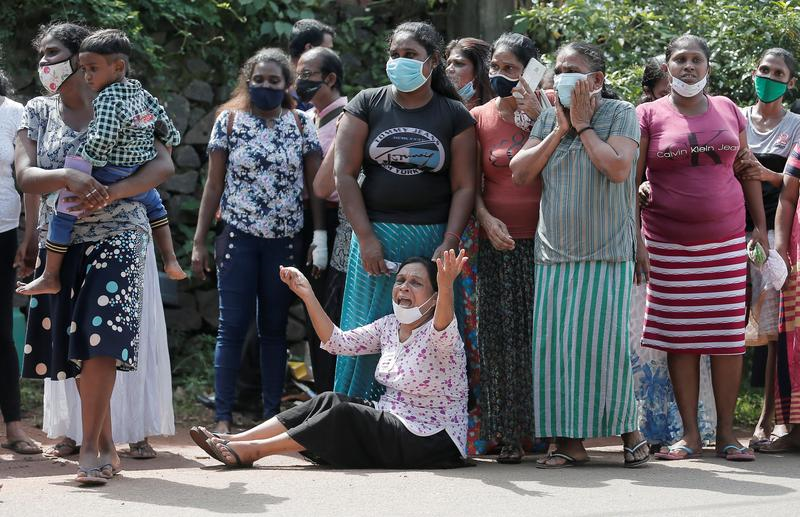Image: Since the day of the massacre families of the victims have been calling for justice.
Dhanushka Silva.
In a landmark development in the pursuit of justice for the victims of the Mahara Prison Massacre, on 22nd January 2024, the Attorney General (AG) on behalf of the Criminal Investigation Department (CID) informed the Court of Appeal they are going to file indictments within next three months against the prison officers who involved with the killings inside the Mahara Prison.
The Mahara Prison Massacre shook the nation’s conscience, with 11 prisoners losing their lives and 117 others suffering severe injuries during a riot that took place between November 29 and November 30, 2020. The brutality of the incident as has been revealed in the legal proceedings in the Walisara Magistrate court, carried out by prison officials, drew widespread condemnation and raised serious questions about the treatment of inmates and the conduct of those entrusted with their care.
The riot at Mahara Prison, sparked by the transfer of COVID-19-infected prisoners from overcrowded facilities, underscored the dire consequences of neglecting public health measures within Sri Lanka’s prison system.
The unrest began as inmates voiced legitimate concerns over the lack of adequate COVID-19 testing and safeguards amidst a surge in cases across the country. As had been reported, with approximately 12 prisoners already testing positive for the virus prior to the riot arising, tensions escalated as inmates demanded increased PCR testing and better containment measures to prevent further spread. However, the failure of prison officials and authorities to address these grievances in a timely and effective manner fueled frustration and desperation among the prison inmates, ultimately culminating in the tragic events of the Mahara Prison Massacre. This devastating episode serves as a stark reminder of the critical importance of prioritizing public health protocols and safeguarding the well-being of all individuals, including those within the prison system, during times of crisis.
Despite the Walisara Magistrate’s order on April 26, 2023 (in case number B3118/20) which found prison officials guilty of using excessive force leading to a tragic loss of life, justice remains elusive as the order sits unimplemented for nearly a year. This stagnation raises serious concerns about the efficacy and integrity of the justice system, leaving victims and their families without closure or accountability.
The failure to execute the Magistrate’s order not only undermines the credibility of the legal process but also perpetuates a culture of impunity within correctional institutions. It sends a distressing message that those responsible for upholding the law are themselves immune to its consequences. Furthermore, the prolonged delay in implementing such a significant ruling exacerbates the anguish of those affected and erodes public trust in the judicial system.
Effort of Lasanthie
Mehenuwara Gedara Lasanthie, the wife of one of the deceased prisoners, along with the Committee for Protecting Rights of Prisoners, took a bold step towards seeking justice. On 6th February 2024, a writ of Mandamus was filed in the Court of Appeal (CA/WRIT/325/2023) to compel the enforcement of the Magistrate’s order dated 26th April 2023.
The filing of the writ marked a critical juncture in the quest for accountability and redress for the victims and their families. It underscored the resilience of those affected by the tragedy and their unwavering commitment to ensuring that those responsible are held to account for their actions.
On 16th February 2024, as noted above, the AG now sets to file indictments against prison officers responsible for mass killing in the Mahara prison. This development represents a significant step forward in the pursuit of justice and accountability for the Mahara Prison Massacre.
The AG’s decision sends a clear message that impunity will not be tolerated any longer and those responsible for egregious human rights violations will be held accountable under the full force of the law. It reaffirms the judiciary’s commitment to upholding the rule of law and protecting the rights of all individuals, including those within the prison system.
Key Challenges
The brutality and scale of the violence shocked the public and underscored the pressing need for comprehensive reform within the country’s prison system. Beyond the immediate loss of life and physical harm inflicted, the Mahara Prison Massacre exposed deep-seated issues of overcrowding, inadequate security and health measures, and the failure to address the welfare of prison inmates. It served as a stark reminder of the urgent imperative to prioritize the rights and safety of prisoners, as well as the need for systemic changes to prevent such tragedies from recurring. As the nation grapples with the aftermath of this devastating event, it is incumbent upon authorities to not only seek justice for the victims and their families but also to implement lasting reforms that uphold human dignity and ensure the well-being of all individuals within the criminal justice system.
The road to justice remains fraught with challenges, and the filing of indictments is only the first step in a long journey towards accountability. It is imperative that the legal proceedings are conducted diligently, transparently, and in accordance with the principles of fairness and due process. Furthermore, it is essential that measures are implemented to prevent similar atrocities from occurring in the future.
This requires comprehensive reforms within the prison system to address systemic issues such as overcrowding, inadequate facilities, and the lack of accountability for misconduct by prison officials. As the legal proceedings unfold, it is incumbent upon all stakeholders, including the government, law enforcement agencies, civil society organizations, and the international community, to remain vigilant and ensure that justice is not only served but also seen to be served.
